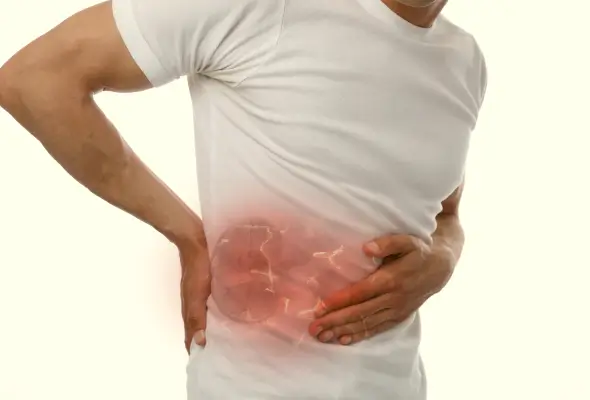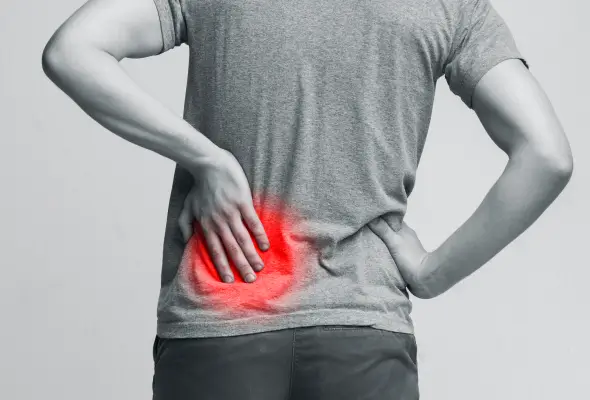-
Doctors
-
Specialities & Treatments
Centre of Excellence
Specialties
Treatments and Procedures
Hospitals & Directions HyderabadCARE Hospitals, Banjara Hills CARE Outpatient Centre, Banjara Hills CARE Hospitals, HITEC City CARE Hospitals, Nampally Gurunanak CARE Hospitals, Musheerabad CARE Hospitals Outpatient Centre, HITEC City CARE Hospitals, Malakpet
HyderabadCARE Hospitals, Banjara Hills CARE Outpatient Centre, Banjara Hills CARE Hospitals, HITEC City CARE Hospitals, Nampally Gurunanak CARE Hospitals, Musheerabad CARE Hospitals Outpatient Centre, HITEC City CARE Hospitals, Malakpet Raipur
Raipur
 Bhubaneswar
Bhubaneswar Visakhapatnam
Visakhapatnam
 Nagpur
Nagpur
 Indore
Indore
 Chh. Sambhajinagar
Chh. SambhajinagarClinics & Medical Centers
Book an AppointmentContact Us
Online Lab Reports
Book an Appointment
Consult Super-Specialist Doctors at CARE Hospitals

Kidney Pain
Symptom, Causes, Diagnosis and Treatment
Kidney Pain
Have you ever experienced a sharp, persistent pain in your lower back or side? It might be kidney pain, a discomfort ranging from mild to severe and affecting many people worldwide. Kidney pain is a common issue that can stem from various causes, including infections, stones, or underlying health conditions. Understanding the symptoms and location of kidney pain is crucial for proper diagnosis and treatment.
This article delves into the world of kidney pain, exploring its symptoms, causes, and potential treatments. We'll examine how to identify kidney pain, where it's typically located, and why it might occur on one side.

What is Kidney Pain?
Kidney pain is discomfort that originates from the area where your kidneys are present. It often manifests as a dull ache felt in your sides, back, or belly. Your kidneys, two bean-shaped organs about the size of your fist, sit just below your ribcage on either side of your spine. You may experience kidney pain on one or both sides of your back, under your ribs. This pain can spread to your belly or groin area.
It's important to note that not all pain in these areas indicates a kidney problem. Kidney pain is often confused with ordinary back pain, but there are differences in how they feel and where they are located. Unlike back pain, kidney pain usually doesn't change with movement.
Symptoms of Kidney Pain
Kidney pain typically manifests as a dull ache in the area where the kidneys are located, just under the ribcage on either side of the spine. This discomfort often worsens when gentle pressure is applied to the affected area. While it's common to experience kidney pain on one side, some conditions may cause pain on both sides of the back.
Accompanying symptoms can include:
- Fever
- Nausea
- Vomiting
- Fatigue
- Changes in the urine, such as cloudiness, darkness, or the presence of blood
- An urgent need to urinate and pain during urination are also potential indicators of kidney issues.
- Individuals might sometimes observe small, gravel-like stones in their urine, suggesting kidney stones.
It's important to note that kidney pain symptoms can vary and depend on the underlying cause, and some conditions may not cause noticeable symptoms until the condition has progressed significantly.

Causes of Kidney Pain
Kidney pain has various potential causes, such as:
- Kidney stones can cause intense discomfort as they move through the urinary tract.
- Urinary tract infections (UTIs) can also lead to kidney pain, mainly if the infection spreads to the kidneys.
- Dehydration may contribute to kidney pain by concentrating waste products in the urine.
- Polycystic kidney disease, a genetic condition causing fluid-filled cysts to grow in the kidneys, can result in pain as the organs enlarge.
- In some cases, kidney pain may stem from injuries or trauma, such as those sustained during contact sports or accidents.
- Urinary retention, where the bladder doesn't empty completely.
- Vesicoureteral reflux, a condition where urine flows backwards from the bladder, may cause kidney pain.
- Certain medical conditions, like diabetes and obesity, can increase the risk of developing kidney problems that cause pain.
Diagnosis of Kidney Pain
Diagnosing kidney pain includes a thorough examination and discussion of symptoms.
- Medical History: Doctors may ask about the pain's location, intensity, and any accompanying issues.
- Blood Tests: Blood analysis plays a crucial role in checking for signs of infection or kidney stones and assessing how well the kidneys filter waste from the blood.
- Urine Tests: Urinalysis helps identify infections, proteins, or other substances that might indicate kidney problems.
- Imaging Tests:
- Ultrasound uses sound waves to create pictures of the kidneys and urinary tract.
- Computed tomography (CT) scans offer detailed images from various angles
- Magnetic resonance imaging (MRI) uses magnets and radio waves for a comprehensive view.
In some cases, doctors might recommend more specialised tests. For instance, a voiding cystourethrogram involves injecting a contrast dye to take X-rays of the bladder when full and while urinating. This test can help identify issues with urine flow or structural abnormalities.
Treatment For Kidney Pain
The treatment for kidney pain depends on its underlying cause, such as:
- Staying hydrated is crucial. Drinking plenty of water helps flush out bacteria and toxins from the urinary system.
- Over-the-counter pain relievers can help manage discomfort, but it's essential to avoid NSAIDs unless directed by a doctor, as they may harm kidney function.
- For more severe cases, antibiotics are often prescribed to treat infections.
- In some instances, hospitalisation may be necessary for intravenous antibiotics and fluids.
- Kidney stones might require specific treatments such as shock wave lithotripsy or ureteroscopy to break up or remove the stones.
- Home remedies can complement medical treatment. Applying a heating pad to the affected area can help soothe pain. Drinking cranberry juice or taking probiotics may support urinary tract health. However, it's crucial to consult a doctor before trying home remedies, especially if you have underlying kidney issues.
When to See a Doctor
Kidney pain often requires medical attention. It's crucial to consult a doctor if you experience persistent discomfort in the kidney area or back pain accompanied by other symptoms, such as:
- Fever or chills
- Nausea or vomiting that prevents eating or drinking
- Changes in urine colour
- Pain or difficulty when urinating
- The presence of pus or blood in the urine
- If you notice solid material (kidney stones) in your urine or feel generally unwell with persistent lethargy
Conclusion
Understanding kidney pain and its management significantly influences overall health and well-being. By recognising the signs and seeking timely medical attention, individuals can take proactive steps to protect their kidney health and prevent potential complications.
Staying informed about kidney health and maintaining open communication with doctors are crucial steps to managing kidney pain effectively. While some cases of kidney pain may resolve with simple measures like hydration and rest, others might need medical intervention. Remember, early detection and proper care can make a big difference in managing kidney-related discomfort and preserving long-term kidney function.
FAQ's
1. What are the signs of your kidneys hurting?
Kidney pain typically manifests as discomfort in your back, under the ribs, on either side of your spine. You might experience fever, chills, and vomiting. Urination may become painful, and your urine might appear cloudy or bloody. Other signs include pain in your sides, groin, or lower abdomen and an urgent need to urinate.
2. What should I do if my kidney is hurting?
If you're experiencing kidney pain, it's crucial to consult your doctor. They can diagnose the underlying cause and recommend appropriate treatment. In the meantime, stay hydrated by drinking plenty of water to help flush out bacteria from your urinary tract. Over-the-counter pain relievers may provide temporary relief.
3. When should I be worried about kidney pain?
Seek immediate medical attention if you have constant kidney pain that doesn't go away, especially if accompanied by fever, body aches, tiredness, or blood in your urine. Other concerning symptoms include severe nausea or vomiting, chills, or an inability to urinate. These could indicate a serious kidney problem requiring prompt treatment.
4. Will kidney pain go away on its own?
While mild kidney pain might resolve on its own, it's essential to identify and address the underlying cause. Some conditions, like minor infections, may improve with hydration and rest. However, more serious issues such as kidney stones or severe infections often require medical intervention. Always consult your doctor if kidney pain persists or worsens.

Still Have a Question?



